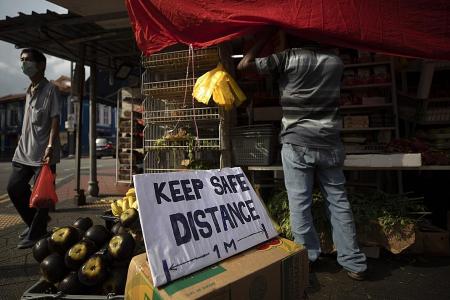Number of unlinked cases up sharply in last two weeks
Experts say increase is because contact tracing may be lagging or community transmission has increased
In the past two weeks, almost three in four Covid-19 cases involving Singaporeans and permanent residents have been unlinked, the latest situation report by the Health Ministry showed.
From March 30 till Sunday, 205 local cases detected are still being investigated for links. They form 72 per cent of the 284 cases still under investigation since the start of the outbreak.
MOH has classified a total of 312 cases as unlinked, with numbers rising over the last two weeks.
Professor Teo Yik Ying, dean of the National University of Singapore's Saw Swee Hock School of Public Health, points to two possible reasons - the trend could reflect greater community transmission, or it could be that contact tracing is lagging behind actual figures, given the high number of daily cases now.
All returning travellers have to serve their 14 day stay-home notice at government facilities, and this has helped to cut off transmission from that source, said Associate Professor Hsu Li Yang, infectious diseases programme leader at the Saw Swee Hock School of Public Health.
However, the relentless rise of unlinked cases is reason for the strict measures - to break the circuit of transmission, infectious disease expert Leong Hoe Nam told The Straits Times.
The latest studies have shown that the virus is more contagious than originally thought, and recent epidemiology models have found that around half of Covid-19 cases might have arisen from carriers who have yet to show symptoms, said Associate Professor Josip Car from the Lee Kong Chian School of Medicine at Nanyang Technological University.
LIFESPAN
Dr Leong noted: "When you do not know if a person has the virus, you let them near you.
"The virus can only be inside the body for around four weeks. If it fails to spread, it dies. Each time it spreads, its lifespan is extended. That is why we must strictly adhere to the circuit breaker measures to stop transmission."
It is also too early to conclude if circuit breaker measures have been effective as it takes around 14 days to see the impact of confinement on the infection figures, experts said.
However, results seem optimistic, Dr Leong added.
He noted that there is a lag between the time when patients begin experiencing symptoms or are confirmed to be positive for Covid-19 and when the cases are announced to the public.
"This delay is necessary - it gives the authorities time to confirm that the patients are positive before it is being announced.
"We actually see a dip in local unlinked cases in the last few days, if you were to look at the ground situation - an indication the circuit breaker might be beginning to show little signs of success."
But Singaporeans must cooperate to fully stop transmission, and continue to remain individually vigilant during and even after this phase, Prof Car said.
He added that though the circuit breaker has already altered lifestyles, in the way people work and learn, and how they express themselves as social beings, "to use a sports language analogy, we're only 20 minutes into the first half of the football match and whilst we're winning with an excellent goal difference, much of the fight is still ahead of us".
Get The New Paper on your phone with the free TNP app. Download from the Apple App Store or Google Play Store now



